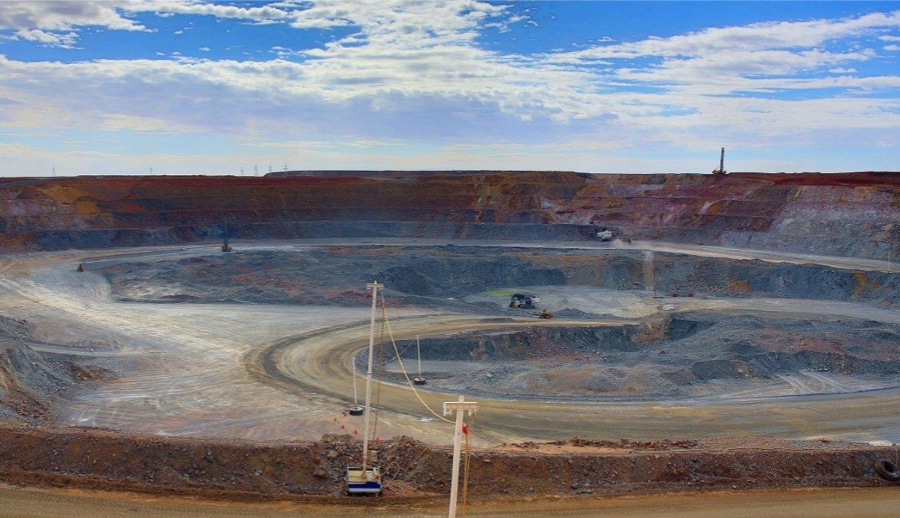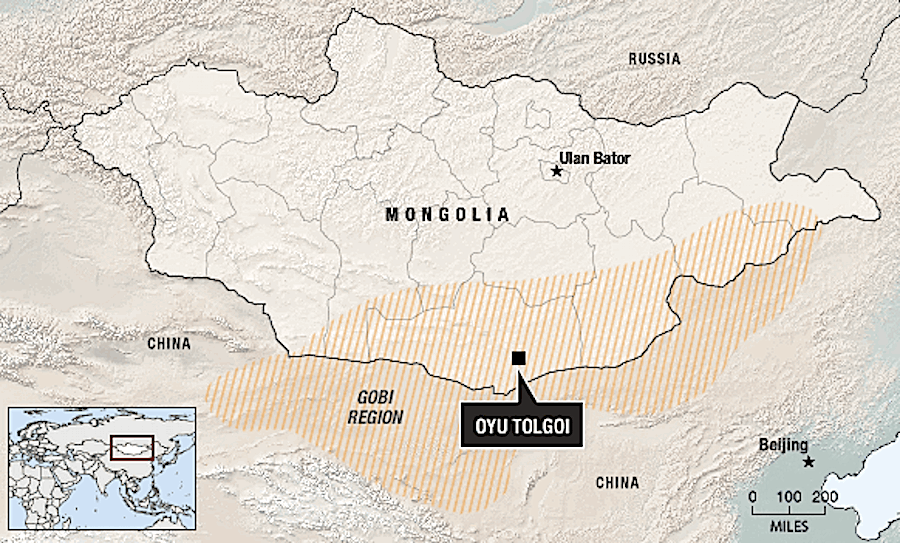Mongolia, Turquoise Hill force Rio Tinto into Oyu Tolgoi review

The Government of Mongolia and representatives of Canada’s Turquoise Hill (TSX, NYSE: TRQ) have set up a special board committee to conduct an independent review into the cost overruns and delays at the Oyu Tolgoi underground expansion flagged by Rio Tinto (ASX, LON, NYSE: RIO) last year.
Two of the commission’s four members were nominated by Turquoise Hill, Oyu Tolgoi’s majority shareholder, with another two chosen by Erdenes Oyu Tolgoi (EOT), Mongolia’s entity that owns the remaining 34% interest in the massive copper-gold-silver mine.
”The special committee has been charged with selecting and engaging an independent and reputable firm of experts in the field of project management, mine planning, cost management and other related fields,” the Mongolian government said in a separate statement.
Turquoise Hill’s participation in an independent review of Rio’s blow outs shows the growing distance between the Canadian company and its biggest shareholder
Rio’s partners’ show of defiance, worked out late on Monday, comes amid threats of legal action from investors against the company for failing to meet the set cost and timeline for the mine expansion.
The world’s second-largest miner confirmed in July that its most important growth project would be delivered almost two years late and close to $1.5 billion over budget. Rio also lowered at the time its forecast for annual copper output at Oyu Tolgoi open-pit, citing coronavirus-related disruptions.
“Turquoise Hill fully supports our government partner, EOT, in securing an independent and objective review of the cost overruns and delays announced last year,” the company said on Tuesday.
“We believe [the move] is consistent with corporate governance best practices, ensures accountability and transparency and will ultimately serve the best interests of Oyu Tolgoi’s owners – EOT and TRQ – as well as our respective stakeholders,” the company added.
The dispute over funding the expansion’s sudden cost increase began heating up in early November when Turquoise Hill launched arbitration proceedings against the mining giant to get clarity on funding.
Rio Tinto has said it will not allow the Canadian miner, in which it holds a 51% stake, to take on more than $500 million in additional debt, and asked the company to fill up a funding gap of up to $3 billion by reprofiling loans and raising equity.
Minority investors in Turquoise Hill, including US hedge fund Pentwater Capital, oppose Rio’s attempts to force the Canadian miner to conduct an equity raise. The claim there are “much cheaper and more advantageous financing options” available to the company, such as streaming and bond financing.
They also worry about Rio growing its stake in Turquoise Hill through such an equity raising. Investors based this argument on the expectation that Rio would underwrite any shortfall created by minority Turquoise Hill shareholders who do not participate in the raising.
Troubles-plagued
Mongolia has complained about overruns in the past. Much of Oyu Tolgoi’s copper lies deep underground. When Rio finally kicked off the delayed project, profits from surface extraction were meant to pay for digging up more of the copper below.
With time, it became clear the underground mine alone would cost as much as a third more than the original $5.3 billion budget.
Mounting investor activism is just one of the may headaches Rio Tinto has had while building what would rank as one of the world’s three largest copper mines when operating at full capacity – now expected to be by 2025 at the earliest.

The Mongolian government’s insistence on owning an equity stake in the mine and has also been a major obstacle for Rio to overcome.
A group of legislators recommended last year a review of the 2009 deal that launched construction of the mine. It also advised revoking a 2015 agreement allowing for the now ongoing underground expansion.
Mongolia’s parliament ended up approving a resolution in December last year, which reconfirmed the validity of all the Oyu Tolgoi mine-related agreements. The decision brought an 18-month-long review to a close.
The underground expansion of Oyu Tolgoi is Rio’s most important growth project. Once completed, it is expected to lift the mine’s production from 125,000–150,000 tonnes in 2019 to 560,000 tonnes at peak output.
{{ commodity.name }}
{{ post.title }}
{{ post.date }}




4 Comments
Ivan G Weber
As magnificent as the Oyu Tolgoi vision surely may be, it is impossible to overestimate the importance of ecological-economic joint impacts to the people of the Greater Gobi Desert region — reaching as far as the Chinese Inner Mongolian flank of the affected area. Variables such as air quality on human health, water quality on regional habitats and ecosystems, and urban/industrial development patterns on future land use changes, all of the changes that will occur even at this macro scale must be fully projected and accounted.
Marpy
And TRQ has made it a priority to ensure that the environment and people of the region are looked after including ensuring that they have adequate water suplies..
Night Rider
TRQ reviewing RIO is akin to a child rating its parents. A joke. Maybe the government and external shareholders can tease out the cronyism and self-congratulatory introspection in TRQ/RIO that have led to this point.
Marpy
Your analogy makes no sense. The management at TRQ have all been appointed by Rio Tinto . They also have experience in there field (adults ;-). What has happened is that the airing of the dirty laundry publicly has forced their hand into making some attempt to have a backbone and look for a more just solution. The alternative would be for them to be sued for not performing there duty to work for all a shareholders.
Your comment really shows exactly what is wrong with Rio Tinto. The minority shareholders are NOT children – they are adults that made a decission to invest in TRQ (some even before Rio Tinto) and have a right to expect to be treated fairly and have proper representation. After all they do own around 49% of the company. treating them like they don’t exist or are children – That about nails the Tinto attitude and the big problem called Rio Tinto.
Also remember that Rio Tinto has been well paid over the years for the services it has provided TRQ (many would argue over paid) while the rest of the share holder have got nothing. It is time for Rio Tinto to stop taking advantage of the situation just because it owns 0.2% more than the rest of the TRQ shareholders!